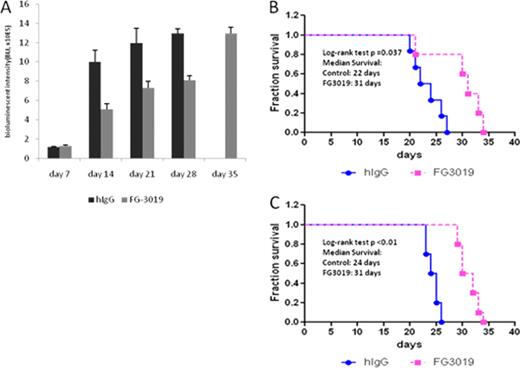Abstract
Abstract 3257
Connective tissue growth factor (CTGF/CCN2) is a member of the CCN family of proteins involved in extracellular matrix production, tumor cell proliferation, adhesion, migration, and metastasis. In pancreatic cancer, CTGF derived from tumor cells is a critical regulator of tumor growth, and CTGF-specific antibody attenuates tumor growth and metastases in vivo (Cancer Res., 2006; 66(11):5816-27). Elevated CTGF levels have been detected in a number of malignancies, including in lymphoblasts from patients with acute lymphoblastic leukaemia (ALL), while no expression of CTGF was detected in normal peripheral blood mononuclear cells. Most importantly, recent studies with microarrays of B-ALL cells showed evidence of increased expression of CTGF, which was significantly associated with inferior outcome (Blood, 2007; 109(7):3080-3). In this study, we characterized mRNA expression and function of CTGF in ALL cell lines (Jurkat, REH, RS4;11, Nalm6) and in samples from primary ALL samples. RS4;11 and REH expressed high levels of CTGF mRNA (479.26±37.17 and 57.31±5.87 per 100 copies of ABL1, respectively), and CTGF secretion into culture supernatants was confirmed by immunoblotting with anti-CTGF antibody. In eleven primary pre-B-ALL patient samples, CTGF mRNA levels varied from 68.68±2.1 to 7030.2±170.47 per 100 copies of ABL1. In contrast, two T-ALL samples expressed very low levels of CTGF (4.7±0.19 and 5.2±0.12, respectively). To determine the functional role of CTGF in proliferation and survival of ALL cells, we utilized lentiviral shRNA to knock-down CTGF in RS4;11 cells. Cells stably infected with shRNA showed significant repression of CTGF levels (75.15%±0.98). Remarkably, CTGF knock down resulted in significant suppression of leukemia cell proliferation (by 57%) compared to control vector, but not in apoptosis induction. This data indicate that CTGF is critically involved in ALL cell proliferation.
We next investigated the anti-leukemia efficacy of the fully human anti-CTGF monoclonal antibody FG-3019 (FibroGen, Inc.) using CTGF-expressing A20-luc/YFP leukemia cells in NOD/SCID/IL2 receptor gamma KO (NOG) mice. FG-3019 was administered intraperitoneally at 10 mg/kg/day twice a week starting on day 7 after leukemia cell injection. Compared to control human IgG, FG-3019 significantly inhibited leukemia growth as determined by bioluminescence imaging (38.3%±1.25) (Figure 1A) and significantly prolonged overall survival from 21 days to 31 days (p=0.01) (Figure 1B). In a subsequent in vivo experiment in NOD/Scid mice, xenografts derived from a primary CTGF-expressing ALL sample were treated with FG-3019 or control human IgG at 10 mg/kg/day twice a week starting at 7 days after cell injection. Similar to the cell line experiment, FG-3019 significantly prolonged the overall survival of animals otherwise dying from leukemia (median survival, control - 24 days, FG-3019- 31 days, p<0.01)(Figure 1C). Altogether, this data demonstrate that autocrine CTGF is highly expressed in pre B-ALL cell lines and primary ALL samples and represents a potential target for therapies blocking CTGF signaling. This is of particular importance given our recent findings of critical role of CTGF in the mesenchymal cells of the bone marrow microenvironment (Battula, ASH 2010). Mechanistic studies of the growth-promoting effects of CTGF in ALL are currently ongoing and will be presented.
(A) Serial bioluminescence images of mice injected with A20-luc/YFP leukemia in groups receiving FG3019 or hIgG. Bioluminescence imaging results were averaged from the peak light-emitting exposure from each group and displayed as photons per second. Error bars represent the SEM of each group.
(B) Overall survival of control (hIgG-treated) and FG3019-treated mice in the A20-luc/YFP leukemia murine model. Statistical significance was calculated using the log-rank test.
(C) In the NOD/Scid mice xenograft model of ALL leukemia, the overall survival in two different groups was estimated by Kaplan-Meier method. Statistical significance was calculated using the log-rank test.
Off Label Use: use of FG-3019 for treatment of ALL. Spong: FibroGen.Inc.: Employment.
Author notes
Asterisk with author names denotes non-ASH members.


This feature is available to Subscribers Only
Sign In or Create an Account Close Modal